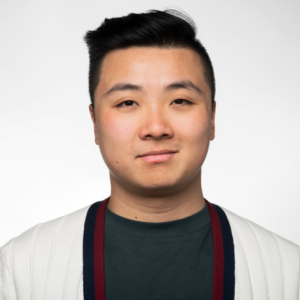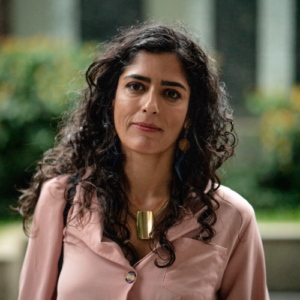Adrian Lee
Meraki Kudos Young Alumni Achievement Award winner
By the time he was 28, Adrian Lee, BJ(Hons)’11, had achieved what most young journalists can only dream of—working as a section editor at a major Canadian news publication. It’s hard to believe that just a few years earlier, he was ready to throw in the towel and walk away from his journalism aspirations.
“I set myself a deadline for getting a permanent job in journalism before I was like, I might have to give it up. And I made that goal by about a year,” he says.
Between 2007 and 2011, the year Lee graduated from King’s, with a combined honours degree in journalism and Contemporary Studies, the newspaper industry shrank by nearly 25 per cent. Smaller publications shuttered, and larger newsrooms downsized across the country. It was a stressful time to be a seasoned journalist, let alone a new graduate entering the field. Most entry-level opportunities came in the form of short-term internships or contracts that rarely led to a permanent position.
“I just believed so hard—especially coming out of King’s—that I could make a career that I love work. It was hard for me to have to face the fact that the vast majority of people don’t experience that.”
It wasn’t Lee’s plan to attend King’s, originally. He had decided on staying in his hometown and going to Toronto Metropolitan University (formerly Ryerson), but a speech from his dad shifted his focus to Halifax.
“He said, ‘It’s not just journalism, it’s this Foundation Year Program, this oeuvre of great literature and great works, and if I was in your position, if I had the chance to do something like that, I would have,’” Lee explains. “I took that to heart … and changed my mind.”
Lee tried to make it work in Halifax after graduation, doing freelance work, retail jobs and internships at the CBC, Metro News, and The Coast. But the prospect of a full-time job there seemed distant, and when he was offered a summer staffer position at The Globe and Mail, he returned to Toronto.
A couple years later, another internship—this time at Maclean’s—led to a longer contract, and then finally, a few years later, a permanent full-time position, catapulting Lee to the position of digital editor and, later, comment editor. In 2018, he left Maclean’s and returned to The Globe and Mail, where he currently works as an editor for the Opinion section.
Lee does not discount the role luck played in his success. He says he is fortunate to be one of the few people being paid to do what they love.
“It is hard to get the world to pay you for the things you are passionate about,” he says. “I was that classic high school kid that was awful at math and loved reading and writing, and I sort of followed that thread, (and I’m) lucky enough to do that for a living.”
Like many millennials in their 30s, Lee says he is now at the point in life where he is reflecting on the last decade, having achieved what he set out to do in his 20s and mastered a particular skill set. It can be jarring, he says, to work so hard, finally grab hold of that “ring,” as he said, and not know what is next.
“I’ve entered the mentorship stage of my career, which is wild because it feels like I just got here,” he laughs.
The journalism industry looks very different since Lee left King’s in 2011, and its future is still precarious and rapidly changing, he says. The value of content is being called into question, and as artificial intelligence becomes more powerful, it will only continue to be undermined. For this reason, Lee says the next five years will be “precedent-setting,” and he is, therefore, reticent to offer any sort of advice.
“If anyone 10 years or older than you is giving you advice on what journalism is, really take that with a grain of salt,” he says. “But I wouldn’t be doing this work if I didn’t think it was worth doing.”
Lee, who is getting married in May, was on the way to his bachelor party when he received a surprise phone call from King’s saying he won this year’s Meraki Kudos award.
“It’s an incredible pleasure and honour to have something that was such a big part of my past (and) that informs my present be something that comes up in my life, especially in this moment where I’m looking to the future,” he says. “King’s was a place where life-changing experiences happen … and it’s always cool to be reminded of the ways in which a place and time affect you.”
Karla Mendes
Judge J. Elliot Hudson Distinguished Alumni Award
When Karla Mendes, MJ’14, told her King’s professors she wanted to write an investigative piece on foreign spy operations in Brazil, they were skeptical that a student at her level could handle the scope of such a project. But Mendes had always dreamed of working internationally as an investigative journalist and was determined. Spoiler alert: working under the guidance of one of Canada’s top national security reporters, she broke the story.
Mendes’s first language is Brazilian Portuguese, and it was during her time at King’s that she published her first story in English, a piece about a Brazilian senate inquiry that found the country unprepared to deal with spying, which Reuters later picked up. She credits her training at King’s for helping her break into English-language news outlets.
“Throughout my King’s MJ degree, I acquired skills that enabled me to change my mindset to write stories in English,” Mendes says, adding the Reuters story was an unprecedented accomplishment in the program. “I clearly remember how the entire faculty and myself (were) euphoric about the publication and sharing it on social media. And we celebrated it afterward with Brazilian feijoada!”
Since then, her list of accolades has only grown. Mendes is the recipient of several national and international awards for investigative reporting, including two awards from the Society of Environmental Journalists for outstanding explanatory reporting, a first-place Geneton Moraes Neto Journalism Award and a third-place for excellence in environmental journalism at the Fetisov Journalism Awards.
Mendes’ work has inspired several documentary films, and her 18-month investigation into the palm oil industry’s impact on Indigenous communities was used to hold palm oil companies accountable for water contamination in Brazil.
Mendes worked as a business reporter for 14 years in Rio de Janeiro, Madrid, Brasilia, and Belo Horizonte. Following her stint at King’s, she received a grant from the Society of Environmental Journalists, which funded her first trip to the Amazon and led to six environmental stories for Reuters.
“Since I concluded my master’s in investigative and data journalism in 2014, my trajectory as a correspondent and investigative journalist for English news outlets has soared,” says Mendes. “King’s welcomed me in so many ways … driving my journalism skills to a much higher level through all the stellar — and tough-marking — professors! The support from the writing centre was also key to (leveraging) my English journalistic writing.”
Mendes is currently based in Rio de Janeiro and working for the American nonprofit news organization Mongabay where she writes features and investigative pieces related to conservation and environmental science. She was also recently named a fellow of the Pulitzer Center’s Rainforest Investigations Network based in Washington, D.C., which investigates topics related to climate change, corruption, and government in the Amazon, Congo region, and Southeast Asia.
In response to receiving the Judge J. Elliot Hudson award, Mendes says, “It’s really an honour to be a recipient of such a terrific award … it’s bringing me back to King’s outstanding community that changed my career completely.”



